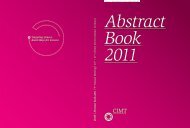Abstract Book 2010 - CIMT Annual Meeting
Abstract Book 2010 - CIMT Annual Meeting
Abstract Book 2010 - CIMT Annual Meeting
Create successful ePaper yourself
Turn your PDF publications into a flip-book with our unique Google optimized e-Paper software.
047 Blaudszun | Cellular therapy<br />
Adoptive transfer of ex vivo activated and antineoplastic drug<br />
loaded T lymphocytes retargeted to EpCAM expressing tumours<br />
André-René Blaudszun 1 , Anja Philippi 1 , Alice Borth 1 , Gerhard Moldenhauer 2 , Philipp Beckhove<br />
2 , Hyeck-Hee Lee 1 and Ute Steinfeld 1<br />
1 Cellular Immunotherapy Group, KIST Europe Forschungsgesellschaft mbH, Saarbrücken, Germany<br />
2 Translational Immunology Unit, German Cancer Research Center, Heidelberg, Germany<br />
T lymphocytes are often the first choice for adop-<br />
tive cell therapy (ACT) against cancers, because<br />
of their intrinsic cytolytic capacity. Unfortunately,<br />
clinical trials have shown that the effectiveness of<br />
ACT is limited. Among various therapeutic options,<br />
chemotherapy remains the mainstay of treatment<br />
for neoplasms. However, therapies based on antineoplastic<br />
drugs are often accompanied by severe<br />
adverse effects, because they are also harmful to<br />
healthy constantly dividing cells and tissues.<br />
Here, we describe a novel cancer therapy approach<br />
that combines the specificity of retargeted T cells<br />
with the high efficacy of chemotherapies. To enhance<br />
the natural cytotoxic function of human lymphocytes,<br />
ex vivo activated and expanded T cells were<br />
loaded with a liposomal preparation of the secondgeneration<br />
anthracycline idarubicin (LipoIda). Although<br />
T lymphocyte viability was impaired upon<br />
LipoIda treatment, mice experiments were carried<br />
out to test the effectiveness of the living drug carriers<br />
in vivo. When SKOV-3 xenograft mice were<br />
treated with either unloaded or idarubicin-loaded<br />
allogenic T cells in combination with the bispecific<br />
antibody EpCAM×CD3, tumour growth was more<br />
efficiently inhibited by the drug-containing cells.<br />
To analyse the observed effect in more detail, we<br />
compared the action of idarubicin-loaded T cells<br />
with the effect of a co-administration of unloaded<br />
T cells and free drug. Xenograft mice treated with<br />
drug-containing T lymphocytes showed a stronger<br />
inhibition of tumour growth than the control<br />
animals suggesting that the combined T cell-drug<br />
effect of LipoIda-treated T cells on malignant cell<br />
proliferation is rather synergistic than additive.<br />
Thus, redirection of antineoplastic drug-loaded<br />
T lymphocytes represents a promising course of<br />
action to treat human cancers. Since the administered<br />
idarubicin amount lies below conventional<br />
therapeutic doses, strong adverse effects typically<br />
caused by chemotherapy are unlikely to occur in<br />
our approach.<br />
91



